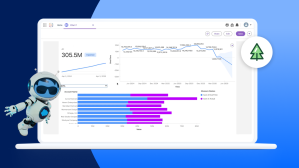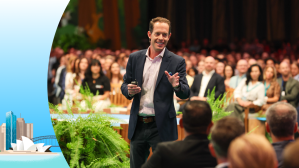Editor’s Note: This article references Salesforce Sustainability Cloud, which is now known as Net Zero Cloud. For the latest on Salesforce’s sustainability solutions, check out this product page. For the latest news on Salesforce’s sustainability efforts, check out this page.
In line with the key initiatives laid out by COP26 — mitigation, adaptation, finance, and collaboration — Salesforce is on an accelerated mission to support one of its largest stakeholders, the planet itself.
Salesforce is a Net Zero company, and just last week, Marc and Lynne Benioff and Salesforce announced a $300 million investment to accelerate ecosystem restoration and climate justice.
Salesforce has been on its sustainability transformation journey for over a decade, and has long been committed to setting ambitious climate targets and supporting cutting edge public policy to drive climate action. Climate is a key part of Salesforce’s public policy platform, and the company is committed to actively advocating for clear and consistent science-based climate policies that facilitate a just and equitable global transition to a 1.5°C future.
As a COP26 partner, Salesforce will advocate for the conference’s key initiatives with insights and momentum gleaned from its own sustainability journey:
Mitigation — Secure global Net Zero by 2050 and keep 1.5°C future within reach:
- Salesforce has achieved Net Zero across its full value chain and has achieved 100% renewable energy for its operations. Salesforce developed emissions reductions strategies across Scope 1, 2, and 3, and has set a goal to reduce its scope 1, 2, and 3 emissions 50% by 2030 and near-zero by 2040.
- Salesforce Sustainability Cloud 2.0 was announced to help customers track and reduce emissions and take action through a full view of their environmental footprint with investor-grade data for customizable ESG reporting. When Sustainability Cloud was first introduced in 2019, Salesforce used to tool to cut its carbon accounting process from move than six months to just six weeks.
- Salesforce has implemented a Sustainability Exhibit as part of all standard procurement contracts with suppliers, requiring them to set science-based targets to reduce greenhouse gas emissions and deliver products and services on a carbon-neutral basis.
Adaptation — Adapt to protect communities and natural habitats:
- Salesforce is a founding partner of 1T.org, and committed to its own goal of 100 million trees by the end of 2030. This year, the company met a critical milestone of 40 million trees funded in just two years since the goal was announced.
- Salesforce announced two new, natural climate solutions: a global tree equity and urban reforestation initiative in partnership with American Forests, One Tree Planted, and SUGi; and a blue carbon program to protect and restore oceans and coastal ecosystems.
- Salesforce has implemented a Blackwater water recycling system in San Francisco’s Salesforce Tower. The first of its kind in San Francisco, the system saves 7.8 million gallons of drinking water annually.
Finance — Developed countries must keep to their promises in mobilizing at least $100 billion in climate finance per year by 2020:
- Salesforce announced the issuance of an inaugural $1 billion sustainability bond — the first sustainability bond by a software company — to support investments in innovative projects that address global climate, equality, and other social challenges.
- Salesforce joined the governments of Norway, the UK, the United States and leading companies including Amazon, Airbnb, Nestlé, Unilever and others, as a founding partner of the LEAF Coalition, a new public-private coalition with the goal of mobilizing at least $1 billion in 2021 to protect tropical forests around the world.
- Salesforce called for mandatory climate disclosures, stating that companies should be required to publicly disclose independent third-party-reviewed emissions information, covering Scopes 1, 2, and 3 as well as emission reduction goals, and there must be a globally recognized and formally governed reporting standard. In addition, Salesforce released its first-ever Task Force on Climate-Related Financial Disclosures (TCFD) report, which supplements its annual Stakeholder Impact Report.
- Salesforce Ventures launched its second $100 million Impact Fund to accelerate the growth of cloud companies addressing some of today’s most pressing needs, including climate action.
Collaboration — We can only rise to the challenges of the climate crisis by working together:
- Salesforce co-founded UpLink, an open-source digital platform to foster mass participation from entrepreneurs around the world to meet the UN’s Sustainable Development Goals. This year’s UpLink Trillion Trees Challenge, co-designed with 1T.org, was a global call for solutions to help meet the goal of conserving, restoring and growing a trillion trees over the next decade.
- Through Impact Labs, Salesforce is convening leading nonprofits and others across government, academia, and for-profit sectors to accelerate innovation and create new technology solutions that will contribute to a more sustainable future for all.
- Salesforce, along with other corporates and environmental organizations, founded Business Alliance to Scale Climate Solutions to help improve and scale corporate climate solutions funding.
- Salesforce actively engages its 10K+ member employee resource group, Earthforce, dedicated to promoting and celebrating environmental responsibility at the company. Earthforce has a formal global leadership team comprised of nine leaders around the world in addition to 90+ local leaders.
- Salesforce expanded its partnership with Accenture — the powerful combination of Accenture’s Sustainability Services, Salesforce Sustainability Cloud, and Salesforce Customer 360. It brings sustainability to the front office and provides the C-suite with true visibility into their company’s historical and real-time ESG data.
Salesforce is committed to the fight against climate change, and COP26 is an urgent moment for all — governments, investors, businesses, individuals — to work together in the effort to save our planet, protect vulnerable populations, and drive equality, while fueling economic growth, job creation, and a more sustainable world.
Read more about Salesforce sustainability:















